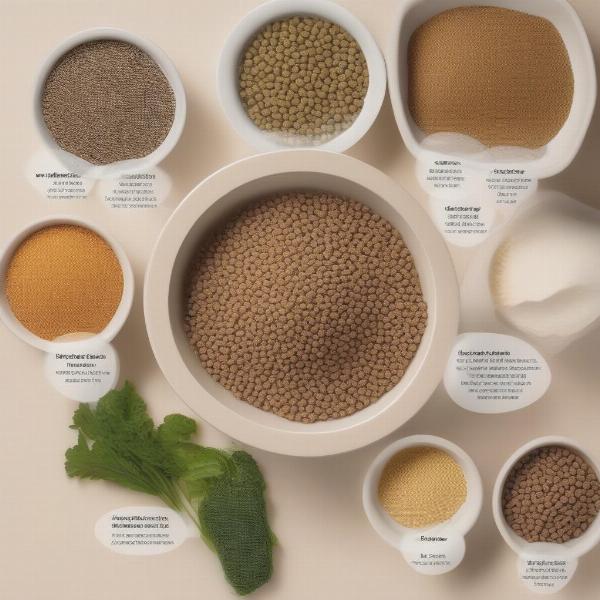Medicus dog food is a brand often associated with veterinary diets, formulated to address specific health concerns in dogs. Understanding the role of medicus dog food in your dog’s diet is crucial for ensuring their well-being, especially if they have specific dietary needs. This guide provides a detailed overview of medicus dog food, its benefits, potential drawbacks, and how to choose the right formula for your furry friend.
What is Medicus Dog Food?
Medicus dog food is typically prescribed by veterinarians to manage a range of health issues in dogs. These therapeutic diets are specially formulated to address conditions such as allergies, digestive problems, kidney disease, joint issues, and more. Medicus dog food differs from regular commercial dog food because it contains precisely balanced nutrients and ingredients to support specific health needs. For instance, a medicus dog food for kidney disease might have restricted phosphorus and protein levels, while a formula for allergies would exclude common allergens.
Benefits of Medicus Dog Food
The primary benefit of medicus dog food is its ability to target and manage specific health conditions. By controlling the intake of certain nutrients and excluding potential allergens, these diets can significantly improve a dog’s health and quality of life. For example, a dog with allergies might experience relief from itching and skin irritation after switching to a hypoallergenic medicus dog food. Similarly, a dog with kidney disease can benefit from a diet that reduces the workload on their kidneys.
Potential Drawbacks of Medicus Dog Food
While medicus dog food offers numerous advantages, it’s essential to be aware of potential drawbacks. One concern is the cost, as therapeutic diets are often more expensive than standard dog food. Another factor to consider is palatability. Some dogs might find the taste or texture of medicus dog food less appealing than their regular food, requiring a gradual transition to avoid digestive upset.
 Ingredients in Medicus Dog Food
Ingredients in Medicus Dog Food
Choosing the Right Medicus Dog Food for Your Dog
Selecting the appropriate medicus dog food for your dog requires veterinary guidance. Your veterinarian will assess your dog’s specific health needs, considering their age, breed, current health status, and any underlying conditions. They will then recommend a suitable formula to address those needs. It’s crucial to follow your veterinarian’s recommendations and avoid switching to a different medicus dog food without consulting them first.
How to Transition Your Dog to Medicus Dog Food
Transitioning your dog to a new diet, especially a medicus dog food, should be gradual. Start by mixing a small amount of the new food with their current food, gradually increasing the proportion of medicus dog food over several days. This gradual transition helps your dog adjust to the new taste and texture and minimizes the risk of digestive upset.
Conclusion
Medicus dog food plays a vital role in managing various health conditions in dogs. While it comes with potential drawbacks such as cost and palatability, the benefits of targeted nutritional support often outweigh these concerns. Always consult with your veterinarian to determine the right medicus dog food for your dog’s specific needs and follow their guidance for a safe and effective transition.
FAQ
- Is medicus dog food only for sick dogs? While primarily used for managing health issues, some medicus dog food formulas can also be used for preventative care.
- Can I give my dog medicus dog food without a veterinarian’s recommendation? It’s strongly advised to consult with your veterinarian before giving your dog any medicus dog food.
- Are there different flavors of medicus dog food? Yes, many medicus dog food brands offer various flavors to cater to different palates.
- How long does my dog need to stay on medicus dog food? The duration depends on the specific condition being managed. Your veterinarian will advise on the appropriate length of time.
- What should I do if my dog refuses to eat medicus dog food? Consult your veterinarian. They might suggest different flavors or ways to make the food more palatable.
- Can medicus dog food be combined with other supplements? Always discuss any supplements with your veterinarian before giving them to your dog alongside medicus dog food.
- Where can I buy medicus dog food? Medicus dog food is typically available through veterinary clinics and authorized online retailers.
About ILM Dog
ILM Dog is your trusted source for expert advice on all aspects of dog care and well-being. We offer a comprehensive resource covering breed selection, health and medical care, training, nutrition, grooming, and much more. Whether you’re a new dog owner or a seasoned enthusiast, our expert content provides practical guidance to help you provide the best possible care for your canine companion. For personalized advice or to explore our range of products and services, contact us at [email protected] or call us at +44 20-3965-8624. Visit ILM Dog today!